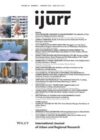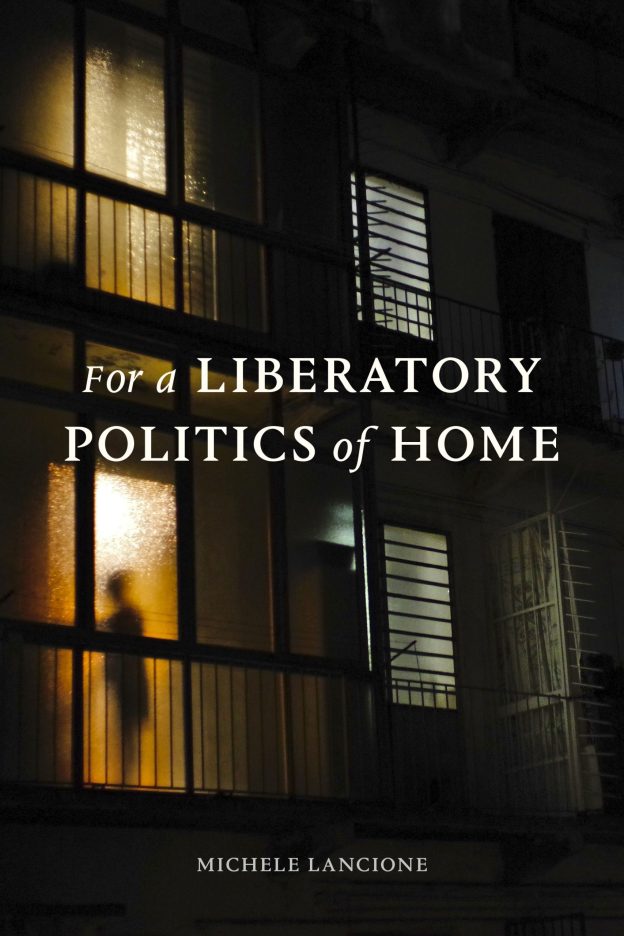The best scholarship demands that we recognize, review, rethink and potentially reimagine the implications of foundational ideas and commitments. It opens our minds to question our perspectives and, in doing so, offers a glimpse of possibility for remaking our world. Michele Lancione’s new book, For a Liberatory Politics of Home, does precisely that. He takes on the ‘politics of home’ from the marginalized position of homelessness; critiquing what he describes as the ‘impossible possibility of home’ (p. 25). This is the view that what we think of as ‘home’—and the terms on which it is made available—are constituted through systems of capitalization, racialization, anthropocentrism and heteronormativity. Critically, he argues that the politics of home is locked into a binary relationship with its ‘lessness’: ‘mainstream ideas of home depend on the expulsion of the other…[as] the basis for the extraction of a sense of security, entitlement, and belonging’ (p. 11). This implicates the politics of home as constituent of the ‘expulsive and extractive praxis that not only keeps the other at bay, but constitutes the other as the only possible way to constantly (re)constitute home itself’ (p. 12).
Critically, the book brokers no argument for the prospect of mitigation within existing paradigms. Lancione criticises scholarship, policies and initiatives that seek to ‘tackle homelessness’ (pp. 60–4), homeless shelters, homeless services, indeed ‘the entire homelessness industry’, rejecting ‘solutions to [home]lessness [that] are crafted within its expulsive and extractive logic—not beyond them’ (p. 4, emphasis added). Instead, Lancione offers a radical alternative paradigm, a ‘liberatory politics of home’: one that rejects ‘entire systems of oppression and related modes of thinking, theorising and discussing’ (p. 4) to open up space, and offer techniques, for an alternative proposition to emerge.
The book advances—in Lancione’s terms—a ‘daring proposition’. In rejecting the whole system of home, housing and inhabitation based on expulsion and extraction, it challenges us to give up all that is familiar and to open ourselves to the implications of accepting that there can be no justice built on violent injustice. Rather, he argues, we must start again in a different place and adopt different practices. Lancione’s prescription is twofold: it combines an alternative social imaginary with a methodological shift: ‘an emancipatory ideology and praxis of inhabitation’ (p. 201). The method is centred on radical care, for and through inhabitation, which also guides Lancione’s resistance to crafting normative content for the new politics of home: rather, he advocates listening to the embodied grammars of precarity and recording their propositions: ‘center[ing] experiences of housing precarity without speaking over the multiple desires emerging from, and produced by, their struggles’ (p. 193).
This fascinating book brings clear-eyed commitment to the scale of the challenge facing advocates for housing justice. It also challenges readers to reflect on their own methodological practices and normative assumptions. One of the implications of Lancione’s compelling indictment of the mainstream politics of home and homelessness is that it confronts us with the question of whether there can be any right living in a wrong world. Many scholars of housing and home will recognise the ‘wrongness’ which leads the author to reject ‘practical solutions’ in favour of a ‘daring proposition’, advanced through three parallel moves: (1) deinstituting current diagrams of power; (2) reinstituting the basic means to rework power; and (3) instituting differential forms of power through collective organizing. This work, he argues, must be rooted in embodied experiences of homelessness, so that ‘[i]t is within precarity, and not elsewhere, that forms of desires elaborating alternative actual and virtual propositions to expulsion and extraction take place’ (p. 42).
While reading the book, I spent time in Cape Town meeting activists, advocates and community organisers who are litigating their fight for access to land for social housing to enable the return of black South Africans to the inner-city from which they were excluded and expelled during apartheid (the documentary Mother City tells their story). These grassroots, community-led campaigns would no doubt cheer for a world that is freed from racialization, capitalization, anthropocentrism and heteronormativity. Yet—while I am sympathetic to his diagnosis, and his methodological commitment to centring the lived experiences of excluded populations, it helped me understand why I struggle with Lancione’s prescription.
First, following Lancione’s commitment to listening and responding with radical care to the desires and struggles of those who have lived embodied experiences of exclusion, expulsion and extraction, I heard their urgent demands for restoration and reparation: for practical action now, long overdue, within the wrongness of the world as it is, even as we commit ourselves to the struggle for a better world. Layered into the question of pace of progress towards some mitigation of injustices is the element of risk. Lancione concedes that the new world he envisions may not materialize: indeed, arriving in a new world is not the point. Rather, the point is to remain in the struggle, working outside institutions, outside the mainstream, ‘in a minor key’, remaining with the trouble and the struggle—an agonism that is on the side and lateral (p. 212).
He is undoubtedly correct in his indictment of institutions which, he observes, are prone to capture even after liberating revolutions. By staying low, the micropolitics he advocates seeks to remain beyond capture. It is, he asserts, ‘not performed to those who do not belong’ (p. 212). Lancione confronts potential challenges to the proposition’s ‘all or nothing’ ethos in his conclusion. Anything short of total rupture is rejected as support for privilege and the inequality of the status quo. The book, he argues, ‘does not propose adjustments but argues for walking away from the table: opening a new drawer, taking up a new slate, writing a different story’ (p. 4).
This technique creates its own binaries: the ‘impossible possibility of home’ arguably divides the struggles of homelessness from those of precariously housed people desperately trying to hang on to home. It asks us to choose which side we are on: between revolution and incremental change; between living less wrongly in the world we have and making a new world; and on working with and on, or outside, institutions of power. On the one hand, it opens up our thinking to necessarily radical new imaginaries and the re-examination of fundamental categories, assumptions and arguments in a way that is critical, if we are to make progress on housing injustice, and apt for the current period of transition. Yet, for those concerned with mechanisms for realizing alternative imaginaries, the practical counterhegemonic task remains. While Lancione is undoubtedly correct in observing that those institutions will remain vulnerable to capture, we are confronted with a choice between ongoing struggle and contestation to institutionalize democratic principles or ceding that struggle and working on the edges.
The case he makes is compelling as well as deeply challenging and I hope the book will be widely read, reflected on, discussed and debated. Readers will reach their own views on whether, or how, to incorporate its insights into their practices. In the end, I struggled to reconcile Lancione’s commitment to working in a minor key, outside institutions, on a case-by-case basis, with my belief that ‘justice’—to be ‘justice’—must be scalable, not ad hoc. This leaves me reluctant, in the end, to give up on reimagining institutions. Despite their flaws and proneness to capture, they still offer the only—imperfect—prospect for pressing towards a scalable model of justice. Institutions are constantly being made and remade: incrementally, laterally, within the mainstream and from the side. That struggle will continue, in parallel with struggles in a minor key. For all who are concerned with housing justice—within or outside institutions—For a Liberatory Politics of Home offers valuable challenges and insights. It will compel you to reflect on your commitments and choices. And, undoubtedly, some will be persuaded by its core message: that there can be no housing justice in the world as it is, and nothing short of remaking it will do.
Lorna Fox O’Mahony, University of Essex
Michele Lancione 2023: For a Liberatory Politics of Home. Durham, NC: Duke University Press.
Views expressed in this section are independent and do not represent the opinion of the editors.

